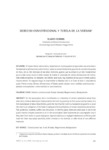Derecho Constitucional y tutela de la verdad

Ver/Abrir
Use este enlace para citar
http://hdl.handle.net/2183/12059Colecciones
Metadatos
Mostrar el registro completo del ítemTítulo
Derecho Constitucional y tutela de la verdadAutor(es)
Fecha
2012Cita bibliográfica
Anuario da Facultade de Dereito da Universidade da Coruña, 2012, 16: 393-408. ISSN: 1138-039X
Resumen
[Resumen] El Estado liberal-democrático, basándose en el presupuesto de que existe una veracidad o falsedad de las afirmaciones sobre hechos, tutela la verdad mediante la garantía de una libre búsqueda de ésta y de un libre mercado de las ideas. Asimismo, puesto que la verdad es un bien fundamental para la vida social, existe el deber estatal de tutelar la veracidad de ciertas afirmaciones de hechos. Esta tutela encuentra, no obstante, dos límites: ante todo, hay hipótesis en las que el interés público impone mentir. En segundo lugar, es inadmisible la falsedad sólo si es fruto de dolo o imprudencia grave. Frente a estas últimas afirmaciones, el Estado puede adoptar tanto medidas sancionatorias –penales o extrapenales- como medidas no sancionatorias. [Abstract] On the assumption that a truthfulness or a falseness of certain statements about facts does exist, a liberal-democratic State protects the truth by granting its free pursuit and by means of a free marketplace of ideas. Nevertheless, given the fact that the truth is a fundamental good for a social life, there is an obligation of the State to safeguard the truthfulness of certain statements about facts. This protection, however, suffers two limitations. In the first place, there are some cases in which the public interest compels someone to lie. In the second place, false statements are unacceptable only if they stem from malice or gross negligence. Against malicious or negligent statements conflicting with truth the State may adopt sanctions, either criminal or not criminal, or other kinds of non-afflictive measures.
Palabras clave
Derecho constitucional
Verdad
Falsedad
Negacionismo
Manipulación
Constitutional law
Truth
Mistake
Negationism
Manipulation
Verdad
Falsedad
Negacionismo
Manipulación
Constitutional law
Truth
Mistake
Negationism
Manipulation
ISSN
1138-039X





